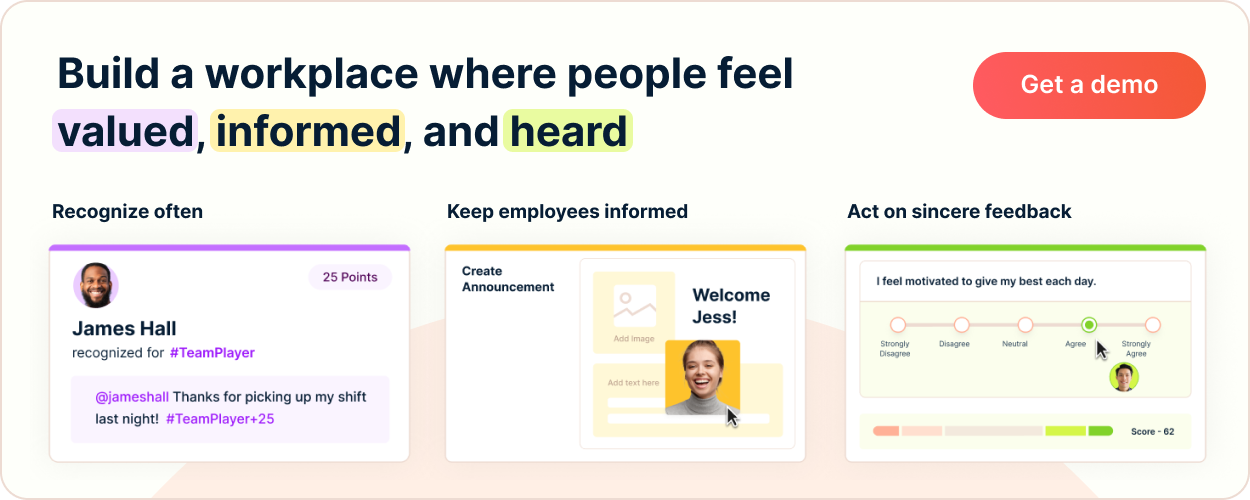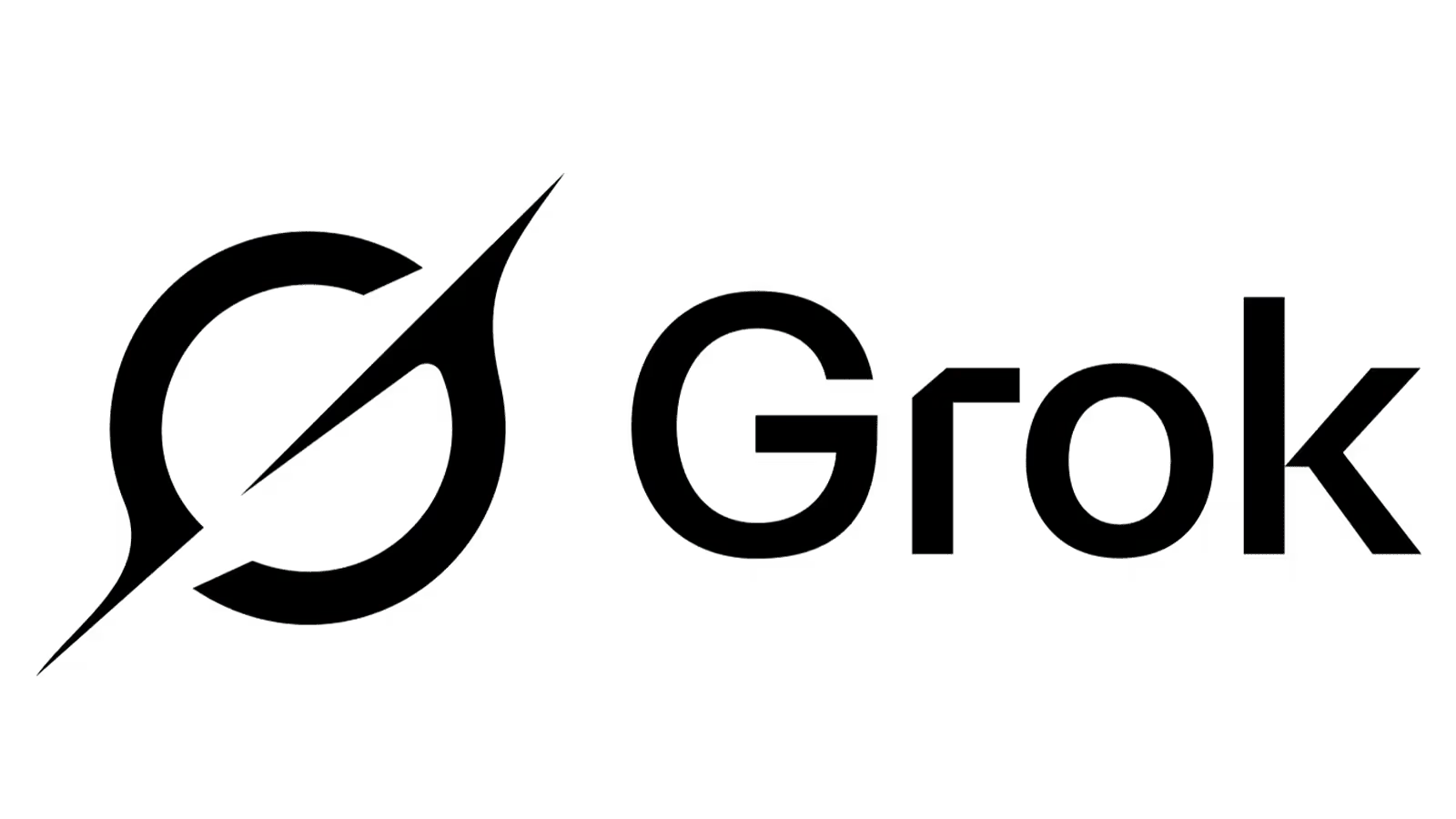120 One-On-One Question Ideas All Managers Should Ask

Your one-on-one meeting is blocked out in the calendar. You want to make the most of the time so you and your employee find it valuable. But how do you ask the right questions so the meeting flows like a conversation rather than an interrogation?
This guide includes 120 one-on-one questions to ask employees, divided into 12 different categories to cover all bases. We also explain why regular one-on-one meetings are valuable to the manager-employee relationship and the importance of structuring your meeting questions and format appropriately.
How Do One-On-Ones Impact Work?
It’s hard to believe that a private meeting between two people could have such an influence on the overall work environment. But while these discussions focus on strengthening the employee-manager relationship, they also have a ripple effect on everyone around them. Here are six benefits of committing to a one-to-one program:
They Build Trust And Rapport
Trust is an essential aspect of any successful working relationship. When employees trust their manager, they’re more likely to be honest and transparent about their current challenges or roadblocks.
One-on-ones are the perfect trust-building environment. The act of managers carving out time to listen to their employees signals that they’re invested in the relationship and their employees’ well-being. The sessions create a sense of safety and comfort, resulting in a strong rapport between managers and employees.
They Foster Employee Development
Training and development is an obvious discussion area in any check-in meeting. Employees want to understand their career opportunities within the company, while managers want to check their direct reports are committed to progress. Teresha Aird, Cofounder & CMO of Offices.net, explains,
“Having a good understanding of employees’ interests can help managers provide relevant opportunities, such as training, mentoring, or new projects, and not just dictate top-down how they progress. This has the dual-purpose effect of enhancing employee engagement while also building a stronger, more skilled workforce.”
They Drive Innovation
Each employee in your organization brings their own blend of ideas, knowledge, and perspectives to the table. They may feel uncomfortable voicing their opinions in public, but use the one-on-one conversation to brainstorm innovative work ideas that could benefit the company.
They Identify Issues Early
“Regular 1:1s also provide an opportunity to address emerging issues before they have a chance to fester, leading to increased job satisfaction and productivity,” says Teresha Aird.
By jumping on these issues, managers can prevent them from becoming larger problems that negatively impact the employee’s work and overall morale. Better still, they’re also a proactive way to dissuade job hoppers from looking for their next opportunity.
They Resolve Conflict
Managers can also use one-on-ones to uncover and resolve any conflicts, such as miscommunication or a difference in working styles before they escalate. These meetings provide a safe space for employees to express their concerns and work towards finding a solution.
CEO Maxim Ivanov shares an example of why these meetings have been essential at IT staffing company Aimprosoft:
“I recall a particularly challenging situation due to a conflict in which an employee discussed communication problems with their manager in our office kitchen. When I suggested they talk directly to their manager, they were initially afraid and asked me not to share the information. I then asked what outcome they desired and what steps they envisioned. This approach helped the employee understand the necessity of direct dialogue, as problems between two people cannot be resolved by only one party.
Seeing the employee realize the importance of addressing the issue directly was incredibly rewarding.”
Why Should Managers Find Good Questions To Ask During One-On-Ones?
The success of your one-on-one meeting boils down to the questions you ask, including their format, content, and length. Instead of firing out a random mix of questions or conversation starters during your meeting, the right prompts will:
1. Promote Depth And Insight
A well-structured question gives employees space to provide a value-packed answer that a good manager can act on. For this reason, Emily Walton, Founder and CEO at Alo Coaching, recommends to keep meeting questions open-ended:
“You’ll get so much more from the response than if you ask a question that leads to a yes or no answer. To ask open-ended questions, start with “What” or “How.”
For example, asking “What challenges have you faced this week?” as opposed to “Did you face any challenges this week?” promotes a deeper, meaningful conversation that uncovers valuable insights.
2. Deliver Honest Feedback
Non-leading questions allow employees to share candid feedback. Questions like “How do you feel about the current project?” rather than “Do you think the current project is going well?” avoid suggesting a “correct” answer and encourage genuine responses.
Nectar tip: You’ll only extract the most honest responses if you’ve provided a psychologically safe work environment where employees feel comfortable speaking their minds without fear of reprisal.
3. Encourage Reflection And Self-Assessment
Encourage employees to speak up by asking reflective questions that prompt employees to evaluate their own performance and experiences. For example, “What accomplishments are you most proud of this month?” help employees reflect on their achievements and areas for growth.
4. Identify Root Causes
Probing questions enables managers to dig deeper into specific issues. Imagine you’re struggling to understand why your direct report appeared emotional in Friday’s team meeting. You might ask, “Can you tell me more about why you felt frustrated during the last meeting?” This direct approach could uncover issues you weren’t previously aware of.
5. Strengthen Personal Relationships
Managers and direct reports may belong to different ranks of your org chart, but they’re both humans, and it’s important to find common ground as the foundation of a strong working relationship. CEO Emily Walton recommends,
“Ask for an update about the latest news they shared with you. Did they just buy a house? How is that going? Are they caring for an elderly parent? Asking for an update shows that you actively listened and that you genuinely care how things are going for them.”
6. Support Career Development
Goal-oriented questions focus on the employee’s future aspirations and career growth. Questions like “What skills would you like to develop further?” or “Where do you see yourself in the next two years?” guide career conversations toward long-term development.
Nectar tip: Remember to make room for different types of manager-employee meetings in your calendar. While 1:1s should certainly discuss development, they’re not a substitute for dedicated performance evaluations, future-facing development discussions, and stay interviews.
How Should Managers Structure One-On-One Meetings?
One-on-one meetings are entirely customizable according to your goals, the existing relationships, and their duration and cadence. Typically, most will involve some variation of the below structure:
Meeting Prep
Your planning will involve the following tasks:
Select A Suitable Meeting Environment
Choose a quiet, private space where the conversation can be open and uninterrupted or a virtual variation, such as a Zoom call.
Gather Relevant Information
Review previous meeting notes, performance metrics, and any relevant updates to provide context and continuity.
Set An Agenda
Prepare your meeting agenda covering key topics such as ongoing or upcoming projects, personal goals, positive feedback, and professional development opportunities. Share the agenda with the employee in advance to give them time to prepare, but allow plenty of space for flexibility, as recommended by Cheryl Fields Tyler of Blue Beyond Consulting:
“Knowing your people as individuals means tailoring your approach. Adhering too rigidly to an agenda may cause you to miss important cues when employees may need support or guidance. This dedicated time for regular and meaningful interactions energizes everyone involved by making them feel seen, heard, and valued, enhancing alignment and relationship building.”
Discuss Feedback Preferences
Some employees will appreciate the opportunity to go through any feedback before a meeting. Matt Collingwood, a recruiter for Viqu explains,
"There’s a big difference between those who are reactive vs those that are thinkers and how they like to digest information. Therefore, it’s important to ask how an individual prefers feedback before their 1:1. This gives the manager the opportunity to give the individual brief written feedback before discussing it verbally in the 1:1 if they are a thinker and prefer to have time to think things through.”
Meeting Intro
At the start of your scheduled meeting, begin by building rapport with some casual conversation or icebreakers to ease the start of the meeting. Once you’ve settled in, clearly outline the meeting’s purpose and goals, reinforcing that the meeting is a safe space for open dialogue and mutual growth.
Previous Meeting Review
One of your first tasks will be to follow up on previous conversations, perhaps by discussing action items from your last session. You might review progress, address any resolved issues, or acknowledge any accomplishments however large or small.
Current Projects And Tasks
Next is your chance to zoom into the current state of affairs. Ask your employee to provide an update on their current workload, including the biggest challenges they’re up against, or required support.
Development And Growth
Based on their answers, and your meeting prep work, offer constructive feedback on your employee’s performance. Highlight both strengths and areas for improvement, using specific examples to drive your points home. This is also a good time to include some reflection questions, aimed at understanding the employee’s career goals, aspirations, and required skills training.
Concerns And Issues
It’s time to hand over to your employee and let them raise any specific concerns or issues they might have. Use open-ended and probing questions to get to the root of any problems and understand the perspective.
Emma Orr, Director of Winning Business explains the value of given your employees the floor:
“The manager may technically be responsible for the meeting, but give the onus of responsibility to the employee, empower them; they can then guide their own progress in this way. In an ideal world there should be a pro-forma within any given team of these types of questions/statements. This should be prepared from HR to prevent further problems down the road.”
Goals And Action Items
The SMART goal framework is an effective way to collaborate with your employee and set Specific, Measurable, Achievable, Relevant, and Time-bound goals. These should align with their personal development and the broader team’s objectives.
Here’s an example of a goal relevant to a customer service representative’s personal development, combined with the team’s objective to provide an excellent customer experience.
“By the end of Q1, Sarah will have completed her customer service training and passed the final exam with a score of 90% or higher.”
Link a clear action plan to your goal, with defined steps and deadlines. Assign responsibilities and agree on follow-up dates to review your progress.
Provide Resources And Support
No manager can expect their employee to succeed without access to relevant resources or support they need to grow. These might include:
- Tools: Essential software, equipment, reference materials, shared folders, etc.
- Training: Workshops, online courses, podcasts, video tutorials, etc.
- Mentorship: Pair employees with experienced colleagues for guidance.
- Job shadowing: Allow employees to observe various roles and tasks in adjacent departments.
Wrap-Up, Recap, And Post-Meeting
Summarize the key points of your meeting, and confirm that both parties have a mutual understanding of what was accomplished and what is expected.
Schedule a date for your next one-on-one meeting, but reiterate that you’ll keep lines of communication open until then, with regular check-ins to offer support or address any emerging issues.
The final task is to draft a follow-up email to your employee, including:
- The agreed action items
- Timelines
- Responsibilities
- Required resources
- A thank you note for your employees’ time and commitment to their professional development
120 Great One-On-One Question Ideas For Managers
Dip into the pick and mix of questions below to shape your next one-on-one meeting. We recommend using one or two questions from the categories most relevant to your discussion. Although you may feel drawn to many more, be careful not to overwhelm your employees with an endless list.
One-On-One Icebreaker Questions
Icebreaker questions set the mood for your meeting. They get the conversation off to a flying start without any awkward silences or nerves affecting the vibe. Use them to put your employee at ease, establish common ground, and build rapport.
- How was your weekend?
- What hobbies or activities have you been enjoying lately?
- What’s the best thing that happened to you this past week?
- Have you read any good books or watched any good movies recently?
- What’s one interesting fact about you that most of the team doesn’t know?
- What’s your favorite way to relax after a busy day?
- Do you have any travel plans coming up?
- What’s your favorite memory from your time here?
- How did you get into this line of work?
- If you could have any superpower, what would it be and why?
Career Growth And Personal Development
The overarching purpose of holding one-on-one meetings with your employees is to support their professional growth at your company. The below questions focus on their aspirations, training needs, and any obstacles to growth.
- What are your long-term goals?
- What skills would you like to develop or improve?
- Are there any specific training programs or courses you’re interested in?
- Where do you see yourself in the next 3-5 years?
- How can I support your career development?
- What projects or tasks would you like to take on to grow professionally?
- Are there any mentors or colleagues you’d like to learn from?
- What is one area you feel you need to improve in to reach your career goals?
- How do you prefer to receive feedback on your performance?
- What achievements in your career are you most proud of?
Recognition And Rewards
Nectar’s employee recognition study reveals multiple ways that recognition impacts the employee experience:
- 87% of the employees felt that meaningful recognition impacts their job satisfaction
- 71% of employees would be less likely to leave their organization if recognized more frequently
- 81.9% of employees agree that recognition for their contributions improve their engagement
- 77.9% of employees would be more productive if recognized more frequently
- 83.6% of employees believe recognition affects their motivation to succeed at work
Ensure that managers are involved in the recognition cycle by asking questions that reveal if employees feel appreciated for their contributions, and that they’re treated equally to other team members.
- Do you feel adequately recognized for your contributions?
- How do you like to be recognized for your accomplishments?
- Are there any rewards or incentives that particularly motivate you?
- Can you share a time when you felt especially valued at work?
- What kind of recognition do you find most meaningful?
- Are there any achievements that you feel have gone unnoticed?
- How often would you like to receive feedback and recognition?
- What was the best recognition or reward you’ve ever received?
- Do you feel the team celebrates successes effectively?
- How can I better recognize your hard work and achievements?
Task Progress And Performance
Understand the mechanics of how well your employee is performing in their role, the quality of their work, and their ability to handle their current workload. These questions can identify any obstacles your employees are facing, allowing you to be resourceful in how you support them:
- Can you give me an update on your current projects?
- What progress have you made on your key tasks since our last meeting?
- Are there any obstacles preventing you from completing your tasks?
- How do you feel about your current workload?
- What resources or support do you need to meet your deadlines?
- Are there any tasks that you find particularly challenging?
- How can I help you be more effective in your role?
- What are your top priorities for the next few weeks?
- How do you track your progress and stay organized?
- Are there any processes that could improve your productivity?
Employee Feedback
Managers willing to ask their employees for feedback are sending a clear message: they care about their team members’ opinions and are always willing to adapt their leadership style. The following questions will help you understand if your workers are satisfied with your team or company’s current feedback systems:
- Do you have any feedback for me on how I can support you better?
- What aspects of your job do you enjoy the most?
- Are there any parts of your role that you find particularly challenging or unsatisfying?
- How do you feel about the current team dynamics?
- Are there any improvements you’d like to see in our workflow?
- How can we improve communication within the team?
- Do you feel your ideas and opinions are valued by the team?
- Is there anything you’d like to change about your role or responsibilities?
- How do you feel about the feedback process in our team?
- Are there any resources that would make your job easier?
Strategic Alignment
It’s easy for employees to become engrossed in their individual tasks and not see or know how they contribute to the bigger picture. Checking in with the following questions can keep everyone aligned:
- How do your current tasks align with the team’s goals?
- Do you feel you have a clear understanding of the company’s vision and mission?
- How can we better align your work with the company’s strategic objectives?
- Are there any areas where you see a disconnect between your work and the company’s goals?
- How do you think your role contributes to the overall success of the company?
- What can I do to help you better understand our team’s strategic direction?
- Do you feel you have enough information to make informed decisions in your role?
- How can we improve the alignment between individual goals and team objectives?
- Are there any strategic priorities you think we should focus more on?
- How do you keep track of the team’s progress toward our strategic goals?
Company Culture
Company or team culture is hard to define, but your employees will feel it in every interaction they have during their tenure. The following questions will help you understand if your employees belong to a supportive environment with great morale, or if aspects of your culture are toxic and detrimental to your employees’ wellbeing and the company’s future.
- How do you feel about the company’s values and culture?
- Are there any cultural aspects of the company that you think could be improved?
- Do you feel valued within the team?
- How can we foster a more inclusive and diverse workplace?
- What do you think makes our company culture unique?
- How do you feel about the company’s approach to work-life balance?
- Are there any traditions or events you particularly enjoy at our company?
- How can we better support the well-being of our employees?
- Do you feel the company’s culture supports your professional growth?
- Are there any changes you’d like to see in our company culture?
Workplace Relationships
Some 77.63% of employees consider workplace connections important or very important in achieving a great company culture. Based on Nectar’s research, ask the following questions to understand if employees feel welcome in your team, how well they get along with colleagues, or if any tension between team members impacts productivity.
- How do you feel about your collaboration with team members?
- Are there any team dynamics that you think could be improved?
- Do you feel you have the support you need from the team?
- How can we improve communication within the team?
- Are there any conflicts or issues within the team that need to be addressed?
- How do you feel about the level of teamwork in our team?
- Are there any colleagues you find particularly inspiring or helpful?
- How can we create a more positive and supportive team environment?
- Do you feel comfortable reaching out to team members for help?
- How do you prefer to communicate and collaborate with the team?
Work-Life Balance
While the manager-employee relationship is focused on work, it’s important to understand that employees have a life outside of their jobs. Checking in on their work-life balance can help you identify any potential burnout or stress factors that may impact their performance and well-being.
- How are you managing your workload and stress levels?
- Do you feel you have a good work-life balance?
- Are there any adjustments that could help you achieve a better balance?
- How can I support you in managing your work and personal responsibilities?
- Do you feel you have enough time for your hobbies and interests outside of work?
- Which specific work tasks or responsibilities consistently impact your ability to maintain a healthy work-life balance?
- How do you recharge and unwind after work?
- Are there any flexible work arrangements that would benefit you?
- How do you feel about the company’s approach to work-life balance?
- What can we do to support your physical and mental health?
Internal Communication
Keeping everyone in the loop about news that impacts them ensures inclusivity and high engagement levels. Check your internal communications strategy is working as anticipated by asking:
- How do you feel about the communication within our company?
- Do you understand which tools are appropriate for certain types of messages?
- How can we improve the flow of information within the team?
- Do you feel you receive enough information to do your job effectively?
- How do you prefer to receive updates and important information?
- Are there any communication barriers that need to be addressed?
- How can we ensure everyone’s voice is heard in team meetings?
- Do you feel comfortable sharing your ideas and opinions with the team?
- How do you think we can improve cross-departmental communication?
- What can I do to improve my communication with you?
Challenges, Roadblocks, And Concerns
Ideally, your work environment will feel supportive and transparent so employees can freely voice their concerns. If this isn’t the case, use the following prompts as a gentle nudge to learn more about the obstacles they come up against:
- What challenges have you faced recently?
- Are there any roadblocks that are preventing you from doing your best work?
- How can I help you overcome these obstacles?
- What resources or support do you need to address these challenges?
- Are there any concerns you have about your role or the team?
- How do you feel about the current direction of your projects?
- Are there any external factors affecting your work performance?
- How can we better anticipate and mitigate potential challenges?
- Do you feel you have the tools to succeed in your role?
- What can we do to address any concerns or issues you have?
Wrap-Up Questions
The following questions are a mix of reflective and future-facing questions. Managers can check that their employees extracted value from the meeting and how the time spent may shape the weeks to come:
- What are your main takeaways from today’s meeting?
- Are there any action items we need to follow up on?
- How do you feel about the progress we’ve discussed today?
- What are your priorities before our next one-on-one?
- Do you have any final thoughts or questions before we wrap up?
- How can I support you in achieving your goals before our next meeting?
- Are there any topics we didn’t cover today that you’d like to discuss next time?
- How do you feel about the structure and format of our one-on-ones?
- Is there anything you’d like me to do differently in our future meetings?
- What are you looking forward to in the coming weeks?
Strengthen The Manager-Employee Bond With Nectar
Nectar is an employee recognition platform offering numerous features for managers to celebrate their employees and enhance their experience working for your company. Here’s how you might use the following tools:
- Recognition: Managers can celebrate their employees’ contributions by sending shoutouts and redeemable reward points in the internal Nectar feed.
- Rewards: Employees can exchange accumulated points for a range of rewards, such as Amazon products, gift cards, charity donations, and company swag. Managers can get truly creative by creating their own custom rewards for their team members, such as PTO, private lunches, or mentorship sessions.
- Challenges: Managers can incentivize their employees to participate in fun and engaging tasks that align with company goals, such as health and wellbeing, growth and development, compliance, and more.
- Milestones: Managers don’t need to remember their employees’ special occasions—they’re all automated in Nectar, so each individual receives a celebratory message and points on their birthday and work anniversary.
Ready to learn how Nectar can help leaders recognize and reward employees effectively and efficiently? Book a free demo today.















